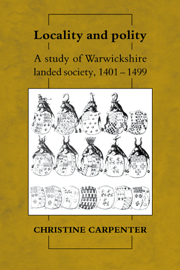Book contents
- Frontmatter
- Contents
- List of figures and tables
- Preface
- List of abbreviations
- Note on text
- 1 Introduction
- PART I STRUCTURAL
- PART II CHRONOLOGICAL
- 9 Social and political networks 1401–50
- 10 Warwickshire under Richard Beauchamp: 1401–39
- 11 The interregnum: 1439–49
- 12 The period of crisis I: Warwickshire under the Kingmaker: 1449–61
- 13 The period of crisis II: Warwickshire under the Kingmaker and the duke of Clarence: 1461–78
- 14 The period of crisis III: Warwickshire under the crown: 1478–85
- 15 The period of crisis IV: Warwickshire under the crown: 1485–99
- 16 Politics and society c. 1449–1500
- 17 Conclusions
- Appendices
- Bibliography
- Index
10 - Warwickshire under Richard Beauchamp: 1401–39
Published online by Cambridge University Press: 27 October 2009
- Frontmatter
- Contents
- List of figures and tables
- Preface
- List of abbreviations
- Note on text
- 1 Introduction
- PART I STRUCTURAL
- PART II CHRONOLOGICAL
- 9 Social and political networks 1401–50
- 10 Warwickshire under Richard Beauchamp: 1401–39
- 11 The interregnum: 1439–49
- 12 The period of crisis I: Warwickshire under the Kingmaker: 1449–61
- 13 The period of crisis II: Warwickshire under the Kingmaker and the duke of Clarence: 1461–78
- 14 The period of crisis III: Warwickshire under the crown: 1478–85
- 15 The period of crisis IV: Warwickshire under the crown: 1485–99
- 16 Politics and society c. 1449–1500
- 17 Conclusions
- Appendices
- Bibliography
- Index
Summary
The politics of Warwickshire were inescapably part of the politics of England: neither royal government nor locality could afford to ignore each other, and nor can the historian forget the fact that each inevitably impinged on the other. It is for this reason, by way of a preface to the analysis of Warwickshire politics in the fifteenth century, the structures that linked locality to polity will be briefly considered. This was a two-edged relationship concerning on the one hand enforcement and on the other response. To begin with the former, how centre and locality worked together would determine whether the king ruled or merely reigned. We have seen already that there was both an official and an unofficial chain of command, the one working through the king's appointed officers, the other through the exercise of privately-owned force and private networks of relationships. The two chains were interlinked and mutually reinforcing. The fact that at the local level the officers were the private powers, an equation expressed in the very qualifications for office, makes nonsense of any attempt to separate the two means of enforcement.
We have seen also that the nobility had a peculiarly important pivotal role between centre and locality. The area that a magnate might command, where he was ‘a man of worship', delineated by the geography of his estates, was his ‘contree', and he would normally expect his authority over it to be recognised by appointment to the commission of the peace in the counties that lay within it. But this in itself was more a public recognition of his private greatness than a means of conferring official authority.
- Type
- Chapter
- Information
- Locality and PolityA Study of Warwickshire Landed Society, 1401–1499, pp. 347 - 398Publisher: Cambridge University PressPrint publication year: 1992



